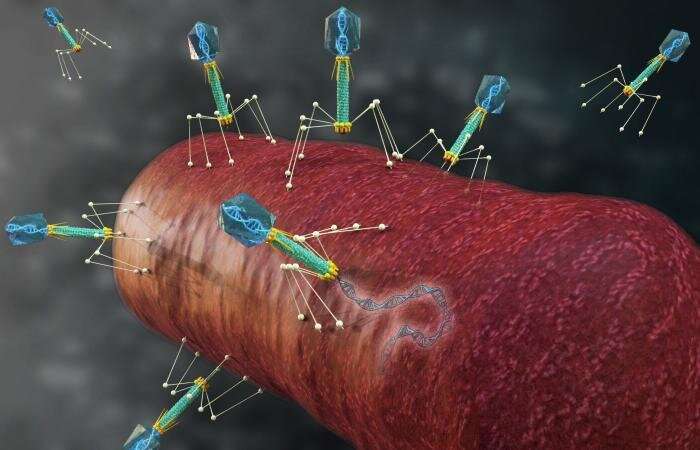This article has been reviewed according to Science X's editorial process and policies. Editors have highlighted the following attributes while ensuring the content's credibility:
fact-checked
peer-reviewed publication
trusted source
proofread
Research team proves bacteria-killing viruses deploy genetic code-switching to deceive hosts

Scientists at the Department of Energy's Oak Ridge National Laboratory have confirmed that bacteria-killing viruses called bacteriophages deploy a sneaky tactic when targeting their hosts: They use a standard genetic code when invading bacteria, then switch to an alternate code at later stages of infection.
Their study provides crucial information on the life cycle of phages. It could be a key step toward the development of new technologies such as therapeutics targeting human pathogens or of methods to control phage-bacterial interactions in applications ranging from plant production to carbon sequestration.
Scientists have predicted since the mid-1990s that some organisms may use an alternate genetic code, but the process had never been observed experimentally in phages. ORNL researchers obtained the first experimental validation of this theory using uncultivated phages in human fecal samples and the lab's high-performance mass spectrometry to reveal the intricacies of how phage proteins are expressed in the host organism. The work is detailed in Nature Communications.
"Phages can be major drivers of ecosystem change," said Samantha Peters, a postdoctoral researcher in ORNL's Biosciences Division who helped design and conduct the experiments. Phages have been known to upend bacterial life in a variety of environmental systems, killing as much as 20% of bacteria each day. But not much is known about their role in environments such as the human gut microbiome or in soils, she said.
The scientists confirmed that the phages convert a genome-coding signal that usually halts protein production to instead express a different amino acid entirely, one that supports replication of the phage. That code switch allows the phage to take over the bacteria's biological processes.
"These phages use a standard genetic code early on as they infect bacteria, one that's compatible with the bacterial host," Peters said. "Once the phages are integrated into the host, they hijack the machinery and begin pumping out phage proteins." By the late stage of infection, the host bacterium is unable to stop producing phages and dies.
"It's a bit of a cat-and-mouse process when the phage invades, encounters the bacterial host's defenses, and then switches the coding," said Robert Hettich, who led the ORNL work and heads the lab's Bioanalytical Mass Spectrometry group. By using sophisticated analytical technologies to measure and examine protein functions in a community, ORNL discovered more than 100 distinct peptides, or genetic building blocks, expressing the code-switching tactic.
Recognizing this change to an alternate genetic code helps ensure that scientists' assumptions about phage protein structure and function are correct, Hettich said. Otherwise, phages may not be accurately identified.
Understanding the phage genetic code could lead to insights regarding the transition between when it invades a bacterium and goes silent and when it decides to become a predator. "Alternate coding may provide a key piece of information about how that switch flips in the phage," Hettich said.
The findings also raise the question of whether scientists might be able to use alternate coding to achieve desired outcomes with genetic engineering. "Can you exploit this alternate coding with synthetic biology to build a different kind of protein? This information suggests that ability," Hettich said.
More information: Samantha L. Peters et al, Experimental validation that human microbiome phages use alternative genetic coding, Nature Communications (2022). DOI: 10.1038/s41467-022-32979-6
Journal information: Nature Communications
Provided by Oak Ridge National Laboratory



















